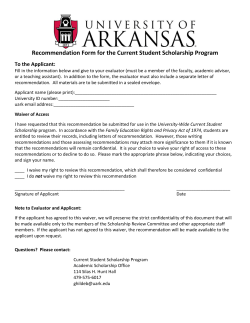
220 West Exchange Street, Suite 007 Providence, RI 02903 Phone: 401-274-4940
220 West Exchange Street, Suite 007 Providence, RI 02903 Phone: 401-274-4940 Fax: 401-274-4941 Rhodeislandnasw@gmail.com www.rinasw.info DATE: March 25, 2014 TO: Senate Committee on Health and Human Services RE: Testimony regarding S - 2769 “Why has government been instituted at all? “Because the passions of men will not conform to the dictates of reason and justice, without constraint.” Alexander Hamilton (1788) “Capitalism needs to serve people, not people serve capitalism. Capitalism is not a social policy.” Harris (2005) The National Association of Social Workers – Rhode Island Chapter (NASW-RI) believes that significant changes in how mental health and substance use services are both viewed and funded are needed to accommodate the unmet needs of thousands of Rhode Islanders living in Rhode Island. As the largest single professional group providing mental health and substance use services to Rhode Islanders, with over 2100 Rhode Island licensed mental health professionals within state borders, we are qualified to weigh in on several areas of the legislation. We certainly are not experts in all suggested changes of the law. My verbal presentation will highlight areas I and II below, however all areas are important to address. I. Title 27, Chapter 19, “Nonprofit Hospital Service Corporations”, Chapter 20, “Nonprofit Medical Service Corporations”, Chapter 41, "Health Maintenance Organizations", and Chapter 50, "Small Employer Health Insurance Availability Act". We have believed for many years that the treatment for mental health disorders should be viewed the same way that primary care is viewed for physical health. Our insurance companies and Medicare treat this area as a specialty service. This creates a huge problem because the duration and frequency of needed services far exceed the ability of many Rhode Islanders to pay the large co-pays often associated with specialty services within insurance plans. It is very seldom that one or two visits will result in a successful outcome for the client. Often several visits, and sometimes ongoing therapeutic sessions, are required to help a person maintain and improve in all identified life areas. Testimony S - 2769 cont. page 2 R. Harris Failure to assist people in meeting their goals for employment, family, and other relationships often results in many problems negatively affecting full participation in our society. Co-Pays Recommendation: Co-pays for mental health and/or substance use services should be no higher than a co-pay for that of primary care. There even may be circumstances in which a co-pay needs to be even lower, dependent upon the intensity and frequency of services needed. II. Title 27. Chapter 38.2 “Insurance Coverage for Mental Illness And Substance Abuse” The only person who is qualified to determine, in the vast majority of cases, the frequency and duration of services is the client themselves. Certainly there are occasions, with good justification, where services need to be limited, however policy priority should be given to the client as much as possible. All healthcare policy should be weighted to respect self-determination and choice of the client system. Duration, Frequency and Intensity of Services Recommendation: Duration, frequency and intensity should largely be guided by the need stated by the client whenever possible. Certainly artificial limitations on the duration, frequency and/or intensity not based on client needs should not be allowed. III. Title 23, Chapter 1, “Department of Health” Routine Behavioral Health Screening. Recommendation: Support IV. Title 23, Chapter 17.12, “Health Care Services – Utilization Review Act” The Director of Health will certify the material equivalence of criteria and review procedures for behavioral health services with those applied to primary care services. Recommendation: Support V. Title 23, Chapter 17.13, “Health Care Accessibility and Quality Assurance Act”, is amended to include behavioral health in Network adequacy standards required by the Patient Protection and Affordable Care Act; that incentives be offered for behavioral health services to be provided on-site in primary care practices; and that incentives be offered for behavioral health services that successfully reduce use of hospital levels of care. NASW – RI supports integrated primary care sites as an option for clients, however, clients should have a choice to see a therapist in a private setting and the private practioner should not be penalized for offering such service. We encourage the development of easily accessible networks between primary care physicians and private practitioners, agency clinical services and other pertinent Testimony S - 2769 cont. page 3 R. Harris professionals. We also support cross training between primary care physicians and private clinical practioners to encourage such networks. Recommendation: Support with conditions. VI. Title 23, Chapter 17.22, "Healthy Rhode Island Reform Act of 2008", is amended to add expectations and incentives for behavioral health professionals to improve the costeffectiveness of their services. Cost-effectiveness should always be the goal of any service. However, any incentive programs to improve cost-effectiveness must ensure that the outcomes are within the control of both the practitioner and the client and not subject to conditions in variables outside of the control of the participating parties. Recommendation: Support with conditions. VII. Title 27, Chapter 20.9, “Contract with Health Care Providers”, is amended that pay-forperformance quality improvement programs offered to primary care physicians or their equivalent will be made available for behavioral health providers. Recommendation: Support. VIII: Title 27, Chapter 50, “Small Employer Health Insurance Availability Act”, is amended to include a focus on behavioral health care and management of health-related behavior in the management of the chronically ill population. It is important that wellness programs and other incentives do not discriminate against individuals who do not have control over certain aspects of their health. All incentive programs should be monitored for this possibility. Recommendation: Support. IX. Title 42, Chapter 14.5, “The Rhode Island Health Care Reform Act of 2004 – Health Insurance Oversight”, is amended to include behavioral health conditions, services, and providers in the Health Insurance Commissioner’s protection of the interests of clients, encouragement of fair treatment of providers, efforts to improve the efficiency and quality of health care delivery and affordability of health care. Recommendation: Support. X. Title 42, Chapter 14.6, “Rhode Island All-Payer Patient-Centered Medical Home Act” is amended to encourage consideration of reforms that would promote inclusion of behavioral health in patient-centered medical homes. See comment V. Testimony S - 2769 cont. page 4 R. Harris Recommendation: Support with conditions. XI. Other Comments: A concern that is not directly included in this legislation, but could occur in it’s implementation is related to insurance driven evidence based practice tools. The current “buzzword” concept in mental health care and treatment is “evidence-based practice”. We believe in evidence-based practice, however not in the global generic formats presented as tools by insurance companies. Successful mental health therapeutic services depends on a huge variety of variables. It is impossible for a pre/post “one-size-fits-all” generic evaluation tool to be used for each session or even at termination of services. We have spent months researching for such tool and have not even come close to finding one. Yet, this is exactly the type of tool insurance companies have been discussing to analyze the quality of the work done by the therapist and to measure client satisfaction. Misuse of these tools can negatively affect both the assessment of the services and, literally, how the social worker and client interact in any given session. Both are susceptible to influence by the use of these tools. Inadvertently, therapists may change how they perform their work to meet the standards of the tool. We call this phenomena in the educational field “teaching to the test”. Clients may also evaluate the service differently because they know the livelihood of their trusted helper is at stake. Some of the variables that are of concern pertaining to a true understanding of measuring the effectiveness of the service include: • “Teaching to the test” syndrome. • The point in which the valuation is determined. For example: Clients often feel worse in the first few sessions as they begin to face the issues that brought him/her to the point of seeking therapy. An evaluating report at this time would appear to be negative. • Inaccurate perceptions. I have known a number of clients with severe depression who were contemplating suicide and then sought help. After several weeks/months the client feels better and terminates service and states the service really did not help that much. However, looking at the client history longitudinally, the same clients repeat this process over and over again because it is an effective coping mechanism. This is one example of how a generic evaluation tool could not pick up on the subtlety. There are many more examples like this with different types of mental health issues. These evaluation tools cannot take into account every variable in the client and the therapist that can affect treatment outcomes and, in my opinion, are not an accurate determination of effectiveness. • The cost of implementing even a simple tool is prohibitive for many private practitioners. Even if the cost is borne by the insurance company, they will not be able to afford to do a comprehensive evaluation tool that is individualized to the specific client and specific therapist. The danger of using a generic tool for all types of services, methodologies and client/therapist relationships is a very real one because it is driven by cost. There is a reason, Testimony S - 2769 cont. page 5 R. Harris in my opinion, a generic tool has not been found to be adequate and safe to use. Implementation of any tool that is not accurate is likely to result in “unfair restriction of trade litigation”, further exhausting limited healthcare dollars. There is good research looking at very specific modalities used for very specific age groups with the same diagnosis. This research shows that the services were very effective when the right modality is matched with the right individulas. Please note: I am officially requesting to be included on the review panel of the Study of this bill. Respectfully submitted by: Rick Harris. LICSW Executive Director
© Copyright 2025












